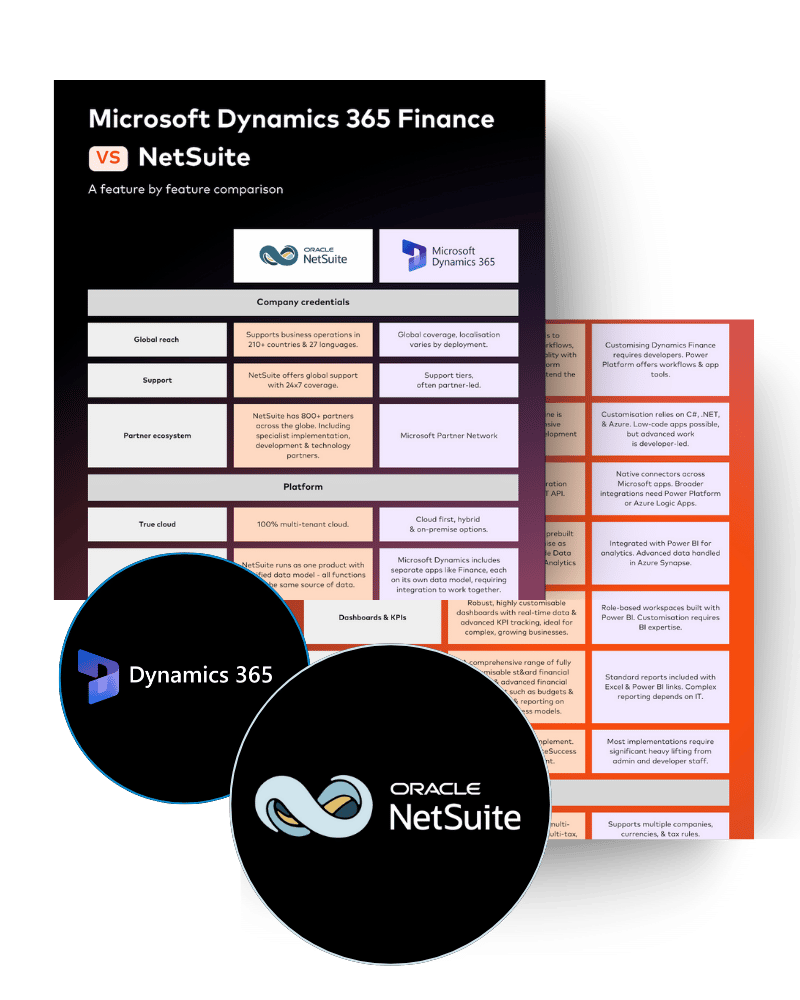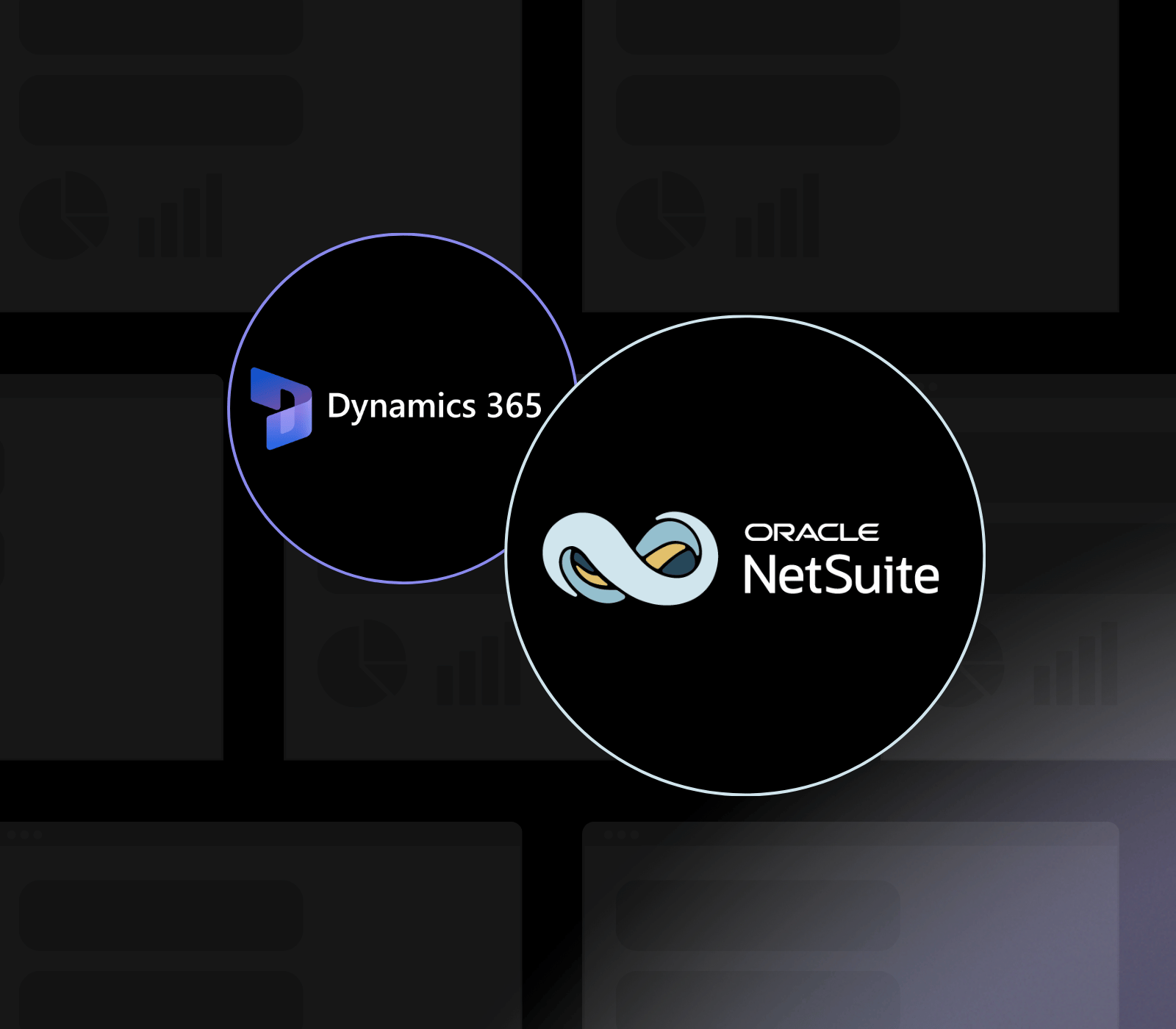Why choose NetSuite over Microsoft Dynamics 365
-
A system built to unify
NetSuite unifies finance, CRM, supply chain and planning in a single platform, while Dynamics 365 often requires added integration effort due to its modular structure.
-
Customise without codebase sprawl
Adjust fields, workflows and reporting using NetSuite’s intuitive, clicks-not-code tools. For more advanced needs, extensibility is supported without navigating multiple frameworks or codebases.
-
Upgrade without disruption
NetSuite delivers automatic updates with built-in compatibility across modules. That means continuous innovation without the manual upgrade projects often seen in Dynamics environments.
Understanding NetSuite vs Microsoft Dynamics 365
-
See NetSuite ERP in action
There’s no better way to explore how NetSuite ERP can benefit your organisation than by experiencing it firsthand.Request a product tour

FREE INFOGRAPHIC
Infographic: Comparing NetSuite and Microsoft Dynamics 365
Download our feature-by-feature comparison infographic to see how NetSuite outperforms Microsoft Dynamics 365 for complex business needs.
Questions to ask before you choose
NetSuite is built for multi-entity management from day one, with native support for consolidated reporting, multi-currency, intercompany eliminations and tax compliance—all in one environment. In contrast, Dynamics 365 Finance typically requires add-ons or integration work to support complex group structures.
NetSuite delivers automatic upgrades twice a year, preserving configurations and avoiding downtime. Dynamics 365 upgrades can vary by module and setup, often requiring planning and intervention to ensure connected apps remain compatible.
NetSuite includes a native CRM that’s fully integrated with finance, inventory and fulfilment, enabling a shared view of the customer across departments. Dynamics 365 Sales is a separate module that often needs additional integration effort and licensing.
NetSuite comes with built-in SuiteAnalytics, saved searches and role-based dashboards for real-time insight. For more advanced needs, NetSuite Analytics Warehouse offers consolidated analysis across ERP and third-party data. Dynamics typically relies on Power BI, which can be powerful but adds extra setup and cost.
NetSuite supports point-and-click configuration for fields, workflows and reports—ideal for lean internal teams. Deeper changes can be made using SuiteCloud, which avoids the multi-language, multi-framework sprawl often required when extending Dynamics 365.
Dynamics 365 Finance is modular and often deployed alongside other Microsoft tools like Power BI or Sales. NetSuite, by contrast, is unified by design – with native finance, CRM, inventory, planning and analytics all in one system. This makes for simpler configuration, faster deployment and easier long-term management.
Choose a cloud ERP system that grows with you
-
Connected from the core
When finance, CRM, planning and operations all sit on one platform, you create a foundation for alignment across teams, processes and strategy.
-
Insight that drives action
With NetSuite, reporting is built into every layer of the platform, giving leaders the visibility to track performance, model scenarios and act early.
Frequently asked questions about NetSuite
Yes. NetSuite supports businesses with multi-entity structures, international operations, complex reporting needs and high transaction volumes. Its scalability and native global capabilities make it a fit for both fast-growing mid-market companies and mature enterprise groups.
NetSuite includes robust reporting via SuiteAnalytics, role-based dashboards, Saved Searches and scheduled reports – all within the platform. For deeper analytics, NetSuite Analytics Warehouse can consolidate ERP and third-party data for powerful, cross-functional insight. Power BI can be integrated if desired.
Yes. NetSuite has an open API and works with leading middleware platforms like Celigo, Boomi and Workato. We regularly integrate with Shopify, Salesforce, HubSpot, Power BI and industry-specific systems.
NetSuite supports point-and-click configuration for most use cases—ideal for mid-sized businesses without large IT teams. For more tailored needs, SuiteCloud provides developer extensibility using industry-standard languages.
Implementation timeframes vary based on complexity, but most projects fall between 12 – 20 weeks. We’ll scope your project upfront and create a detailed, phased plan.
No. As a true cloud platform, NetSuite is managed by Oracle and supported by your implementation partner. Annexa helps configure, optimise and train your team so you stay self-sufficient over time.
let’s chat
Start your journey with Annexa
Request a one-on-one meeting with an Annexa NetSuite expert to discuss your unique challenges and opportunities.
- ✓ NetSuite ecosystem experts
- ✓ Leaders in integration
- ✓ Award-winning team
- ✓ Strategic partner network
- ✓ Innovation always


